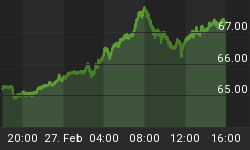Based on the December 2013 Market Overview report
Atlanta Federal Reserve President Dennis Lockhart delivered the news, responding to all speculation about the coming back issue of possible "tapering". Despite the chairman change for Ms. Yellen, the tapering issue did not taper out yet. Lockhart has told us that the Federal Reserve still plans to stay "accommodative" for the number of years to come. This does not mean though that some possible adjustment may not happen, because the "tools" of remaining "accommodative" may change. In other words, the message is: even if some things may change, remember, the Fed is always ready to starts its machine to help banks.
What does he mean exactly by this? Definitely it relates to the "dovish" aspects of Fed's current policies. The underlying message is quite clear: we are not backing out from expansionary monetary framework. The American central bank is still planning to make sure that the banking system has enough Greenbacks, Dollars at hand to keep them afloat. What may change is the tool affecting that process.
We should keep in mind what we have mentioned in the last report: the Federal Reserve has used different special Bernankish tools to make sure that the money-machine is still working in favor of the current benefactors of the American banking system. Those tools in general were:
-
Interest rates kept very low for a significant amount of time
-
Quantitative easing, which meant money production for support of various assets, especially government bonds,
-
Easing in terms of qualitative aspects, that is the expansion of the balance sheet which has benefited not only government bonds, but also some private assets, related to real estate markets.
This leads us to Lockhart's observations. Some form of "tapering" may happen even though the Fed shall stay "easy like the Sunday morning" in its approach to money printing. The simplest possible scenario to imagine is for example a decrease in private assets holdings by the Fed, and moving away in favor of government bonds. At the same time interest rates could stay at record low levels (negative in real terms), and no money vacuum cleaner shall be turned on.
In other words, the Fed could just drop holding on to some paper related to the real-estate without raising the interest rates, and also without sucking out any money from circulation. The Fed could just swap its private paper not for the money, but simply for other government assets. This naturally would favor the Treasury even more than it is favored now.
Overall, the essential difference between the two tools is that asset purchases and interest rate targeting are two separate methods of helping out the banking system. Those details do not change the main goal visible on the horizon: do not let the banks get into trouble. The side effect of the above approach is that over the long run, gold should not get into trouble as well - meaning, that its price is likely to be much higher in the years to come regardless of how low it goes in the coming weeks.
The above is a small excerpt from my December Market Overview report. If you're interested in the possible changes in Fed's policy and their implications on precious metals and your portfolio, we invite you to subscribe and read the full version today.
Thank you.















